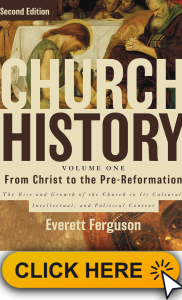CHRISTIAN APOLOGETICS
Describe Christian apologetics in the second century. What were the accusations against Christians? How did apologists like Justin respond? What apologetic principles could be used today in a modern context?

Church History, Volume One: From Christ to the Pre-Reformation: The Rise and Growth of the Church in Its Cultural, Intellectual, and Political Context
Ferguson explains that Christian apologetics of the second century were represented by writers such as Aristides, Justin Martyr, Athenagoras, and Theophilus who referenced a rich Jewish apologetic heritage. The Apologists argued that Hebrew Scripture preceded Greek thought, could be interpreted from a Greek perspective, provided valuable concepts to Greek culture, and supported monotheistic principles embedded in Greek history. (Ferguson, 2005, pp. 71-72, 77) The deep and extensive tradition allowed them to answer important questions regarding the perceived modernism of Christianity, the speculation of an impassible deity, and the dichotomic relationship of demons and martyrs with a benevolent God. (Ferguson, 2005, pp. 77-78) Furthermore, the Apologists transitioned away from a first century focus on Christian insiders by shamelessly utilizing “pagan philosophy and literature to defend and clarify Christian thought” for the benefit of a non-Christian reader. (Ferguson, 2005, p.78)
According to Ferguson, the specific accusations against Christians primarily focused on atheism, cannibalism and incest. A Christian atheist may at first appear counter-intuitive, however, during the second century an atheist was defined as an individual who did not follow the religious tradition of the Greco-Roman culture. The charge of cannibalism may appear even more outrageous without an understanding that the flesh and blood reality of the Eucharist was vehemently argued even by Christians. And unfortunately, language referring to brothers and sisters in Christ sharing a love feast may have been a misunderstanding or simply an excuse for authorities to condemn a religious group not complying with the current cultural identity. (Ferguson, 2005, pp. 66-67) More generally, Christians were accused of criminal activities which included worshipping a man who claimed to be a king and the refusal to participate in certain political activities, both creating a perceived threat to the Roman government. (Ferguson, p. 69)
One of the most important Apologists of the second century was Justin Martyr. (Ferguson, 2005, p. 73) Justin, typical of other apologists, responded to the accusations against Christians by using arguments that integrated a Greek perspective of the Logos, cited Hebrew prophecy, and referenced a Greek culture surrounded by false gods. (Roberts & Donaldson, 1999, pp. 163-186) Regarding charges against atheism, Justin argued that even Greek reason (Logos) through Socrates and Reason Himself, the Word (Logos), in the form of Jesus Christ, denied the assertion that pagan gods were anything other than demons. (Roberts & Donaldson, 1999, p. 164) Justin also used Hebrew prophecy to argue that Christ is the incarnate Son of God by referring to Messianic references from various Prophets including Moses and Isaiah. (Roberts & Donaldson, 1999, pp. 173-180) Finally, Justin utilized Greek cultural perspectives that provided analogies between pagan gods and the Son of God, but argued Christian beliefs can stand on their own regardless of any resemblance; and further suggested that demons would be responsible for any misguided pagan anticipation of the incarnation. (Roberts & Donaldson, 1999, pp. 171-172, 181-183)
In an evangelical environment that, at times, fears secular perspectives, it is possible to extend empathy, as modeled by the second century Apologists, toward modern worldviews of non-Christians. Furthermore, the rich Christian apologetic heritage continues to expand presenting further opportunity to apply its precepts to modern thought. In summary, the empathy of the apologists of antiquity and the foundation of a deep apologetic heritage continue to provide a backdrop for delivering a message of hope relevant to those with a suspicious and untrusting view of contemporary Christianity.
References
Ferguson, E. (2005). Church History: Volume One: From Christ to Pre-Reformation: The Rise and Growth of the Church in Its Cultural, Intellectual, and Political Context. Grand Rapids, MI: Zondervan.
Roberts, A., & Donaldson, J. (Eds.). (1999). Ante-Nicene Fathers Volume 1: The Apostolic Fathers, Justin Martyr, Irenaeus. Peabody, MA: Hendrickson.


